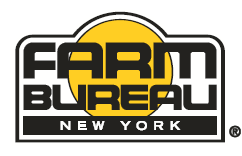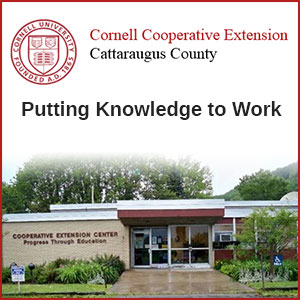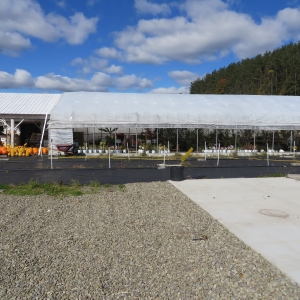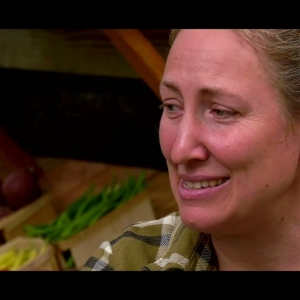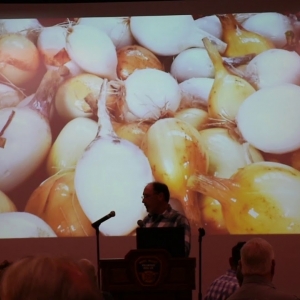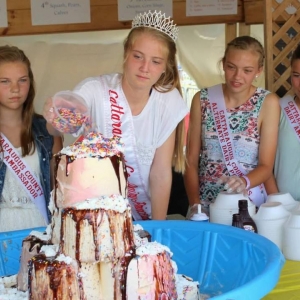Other Ag News:
(Washington, D.C., December 19, 2025) – U.S. Secretary of Agriculture Brooke L. Rollins published an opinion piece in Fox News highlighting the strategic actions the Trump Administration is taking to address price fixing and protect American consumers.
(Washington, D.C., December 19, 2025) – Today, U.S. Secretary of Agriculture Brooke L. Rollins and U.S. Secretary of Labor Lori Chavez-DeRemer signed a Memorandum of Understanding (MOU) (PDF, 258 KB) to fulfill common goals of helping low-income workers find sustainable employment.
This is the final post in the National Sustainable Agriculture Coalition (NSAC)’s series documenting the ongoing staffing crisis across the US Department of Agriculture (USDA). The scale and speed of staffing losses across the USDA, combined with the uncertainty introduced by a sweeping USDA reorganization plan, have weakened the Department at the very moment farmers face rising production costs, unstable markets, and climate-driven disasters. As we conclude the series, the data show a federal workforce under extreme strain and an urgent need for renewed investment in the staff that make the People’s Department function.
A Year Defined by Unprecedented Staffing LossesBeginning in January 2025, USDA experienced historic workforce disruption. Nearly 3,000 employees separated from the agency in the first quarter alone, according to the Office of Personnel Management. These early losses included both longstanding staff, many with 20 or more years of institutional knowledge, and recent hires who had not yet completed their first year of service.
The truly unprecedented staff losses followed soon after, with roughly 15,173 USDA employees who accepted Deferred Resignation Program (DRP) buyouts. 94% of the USDA staff who left via the DRP were located outside of the Washington, DC area. All of the staff who accepted the DRP officially separated from the agency on September 30, 2025.
Figure 1: Location of USDA Staff Who Left Via DRP
The consequences of these losses were immediate.
- Natural Resources Conservation Service (NRCS), already struggling to meet rising farmer demand, lost planners, engineers, and program technicians whose expertise cannot be easily replaced. Promising conservationists like Gretchen Troutman and Josh Hardin are no longer there to help farmers design conservation plans and get funding to protect and enhance the resources that ensure their farm’s viability.
- Farm Service Agency (FSA) lost staff responsible for administering farm loans, disaster assistance, and commodity programs—programs that require precise and timely processing to keep farms solvent. FSA offices like the Oklahoma office where Kevin Dale used to work have had their staff cut in half or are fully vacant, even as work demands increase with the need to allocate 30 million new base acres and administer an additional $12 billion in farm financial assistance.
- Food Safety and Inspection Service (FSIS) and Animal and Plant Health Inspection Service (APHIS) saw experienced inspectors, veterinarians, and plant-health specialists exit, threatening on-the-ground food safety and biosecurity capacity.
- Rural Development offices lost staff with an average of 13.5 years of service, with departures heavily concentrated among the most junior and most senior employees, leaving gaps in both institutional memory and day-to-day operations. These Rural Development staff administer programs like the Meat and Poultry Processing Expansion Program (MPPEP) to help grow rural economies.
- The research agencies Economic Research Service (ERS), National Institute of Food and Agriculture (NIFA), and Agricultural Research Service (ARS) lost economists, scientists, and program leaders whose work underpins federal decision-making, weakening USDA’s capacity to produce market forecasts, evaluate conservation outcomes, support climate research, and administer competitive research grants.
Taken together, the federal workforce responsible for serving farmers, protecting food safety, and supporting rural communities shrank dramatically in a matter of months.
A Reorganization Plan That Accelerates RiskIn July 2025, USDA announced a major reorganization plan, drafted without public input, that would relocate thousands of jobs, consolidate field offices, and restructure core program functions. Early descriptions suggest the relocation of up to 2,600 headquarters and regional staff, along with the consolidation or closure of dozens of field offices across NRCS, FSA, Rural Development (RD), and other agencies. US Secretary of Agriculture Brooke Rollins has publicly stated that she expects up to half of the staff to leave the department rather than relocate.
For agencies already operating with gutted staff and the loss of institutional knowledge, this reorganization introduces additional layers of uncertainty. Staff have been given limited details about timelines, office closures, reassignments, or new reporting structures. Farmers and stakeholders have been offered no clarity on how service delivery might be affected. During their adhoc public comment period on the reorganization, the USDA received nearly 47,000 emails. Their own analysis concludes that 82% of the responses expressed negative sentiment and concerns.
The risk is not theoretical. The deepest staffing losses occurred in agencies already stretched thin and struggling to meet demand, leaving many USDA programs operating with minimal capacity at a time when farmers are facing a worsening financial crisis. Producers rely on these services for conservation planning, loan processing, disaster assistance, and basic continuity of their operations. Any reorganization risks amplifying these strains precisely when farmers need USDA support the most.
The Shutdown and ReopeningWhen the government shut down on October 1, 2025, the incredible importance of USDA staff and services became even more evident. Outreach events were canceled, conservation planning stalled, loan processing halted, and food safety inspections were forced to rely on already overstretched emergency staffing systems.
Farmers like Lindsay, from Tourvaille Farm in Ohio, could not get their conservation contracts paid on time because staff were furloughed. Others like Celeste, a farmer from Washington, didn’t receive their much-needed farm loans and safety net payments. These and the hundreds of other stories of American farmers and rural communities unable to access the resources and services they depend upon made visible the often-overlooked importance of USDA staff.
The bill to reopen the government – passed on November 13, 2025 – included several provisions that shape the future of USDA staffing and services:
- First, the bill provided full-year funding for USDA, ensuring that USDA staff will not be furloughed for the remainder of the 2026 fiscal year.
- Second, Congress inserted new oversight requirements that could limit USDA’s ability to move forward with large-scale reorganizations, relocations, or office closures. This represents one of the first meaningful checks on the reorganization since its announcement.
- Third, the legislation stabilized funding for research, economics, and scientific programs, which had been targeted earlier in the year. These investments protect programs critical for conservation science, agricultural innovation, climate adaptability, and economic forecasting—areas where staff expertise had already thinned due to the 2025 staff losses.
However, the shutdown bill did not reverse the staffing losses the USDA has already endured. It did not pause the reorganization, only slowed it and perhaps established some guardrails. And it did not provide any emergency hiring authorities, retention tools, or explicitly additional staffing budgets that agencies desperately need to rebuild.
Charting a Path Forward for Federal Agricultural CapacityThe staffing crisis of 2025 makes clear that USDA’s capacity has been compromised at the precise moment when robust federal support for farmers is most essential. Without intervention, service gaps will widen, inequities in access will grow, and core missions of the USDA, from conservation to farm resilience, food safety, and rural development, will falter.
NSAC urges the Administration and Congress to rebuild staffing across all USDA mission areas and pause the reorganization until a transparent and iterative process is laid out to meaningfully integrate stakeholder input. USDA must prioritize immediate hiring in NRCS, FSA, RD, and other agencies suffering acute shortages. This includes restoring positions equivalent to those lost through the DRP and other separations and creating pathways for experienced staff to return where appropriate. No USDA reorganization and structural change should proceed until USDA conducts a transparent impact assessment, engages meaningfully with farmers and frontline staff, and demonstrates that proposed changes will strengthen, not weaken, service delivery.
The past year has shown how deeply USDA’s ability to serve the public depends on a strong and stable workforce. As we end this series, the path forward is clear: rebuilding staffing, restoring transparency, and ensuring that any administrative reforms center the needs of farmers and rural communities.
The post USDA Staffing Crisis: A Year of Losses and the Road Ahead appeared first on National Sustainable Agriculture Coalition.
(Washington, D.C., December 17, 2025) – U.S. Secretary of Agriculture Brooke L. Rollins and U.S. Secretary of Health and Human Services Robert F. Kennedy Jr. published a joint opinion piece in Newsweek highlighting the Trump Administration's latest Make America Healthy Again initiative with a focus on regenerative farming and soil health.
As 2025 comes to a close, we find ourselves reflecting on a year that reshaped the food and farm policy landscape: from major disruptions in federal agencies to stalled policymaking in Washington, farmers and communities continue to feel the impacts. The historic government shutdown this fall was just the most recent situation to put our food and farm system under strain. Stable federal programs are critical for farmers and families across the country, and funding delays and terminations, shifting agency decisions, and the loss of experienced staff at USDA have created hardship for millions, especially those who already faced systemic barriers to accessing USDA programs and services.
At NSAC we are always guided by our members and the federal policy priorities we set together – this year those included strengthening the farm safety net, advancing climate resilience in food and agriculture, and building strong local and regional food systems that benefit farmers and families. We moved quickly and creatively to introduce bills in Congress designed to carry reforms and investments forward, we supported farmers and nonprofits navigating agency funding disruptions and terminations with guidance and peer support, and we organized our coalition to speak out in hundreds of channels nationwide – from social media to radio to local and national news – to elevate farmers’ and families’ stories about what was happening on the ground. This blog post reflects on that work, the progress made, the setbacks we faced, and the resolve that carried our coalition through a year marked by both instability and extraordinary collaboration.
Building Better Policies in Washington for the Farm Bill and BeyondCongress failed to pass a full five-year farm bill again this year – leaving everyone who relies on this critical major legislation stuck for another year without an opportunity for real policy reforms or investments. NSAC and nearly 600 national, state, and local organizations delivered a joint letter to Senate and House leadership, as well as Agriculture Committee chairs and ranking members, urging Congress to advance not only an overdue farm bill but one that truly supports family farmers, strengthens rural communities, expands healthy food access, and more. The letter also called on Congress to correct harmful provisions enacted through the recently passed budget reconciliation bill.
We still saw some legislative wins this year: we helped draft, refine, and introduce nearly a dozen “marker bills” this year that together will build better farm and food policy in a future farm bill.
Farm Safety Net
- Save Our Small (SOS) Farms Act – modernizes federal farm safety net programs to make crop insurance and disaster assistance more accessible for small, specialty, and beginning farmers, helping them stay on the land despite economic and climate challenges.
- Crop Insurance for Future Farmers Act – makes crop insurance more affordable and accessible for new and veteran farmers by increasing the premium‑subsidy support and extending the time they’re eligible.
- Farm Ownership Improvement Act – establishes a five‑year pilot program allowing farmers and ranchers to get pre‑qualified or pre‑approved for direct farm‑ownership loans to make it easier for new and beginning farmers to secure land.
- Capital for Beginning Farmers and Ranchers Act – creates a multi-year FSA loan pilot to help new farmers access flexible capital for startup costs, infrastructure, and management systems, addressing high barriers to entry and supporting the next generation of farmers.
- Withstanding Extreme Agricultural Threats by Harvesting Economic Resilience (WEATHER) Act of 2025 – modifies the federal crop-insurance program to create a new type of coverage that pays farmers quickly and automatically when severe weather hits their area, giving them a simpler and more reliable safety net as extreme weather and natural disasters become more common.
Local and Regional Food Systems
- Strengthening Local Food Security (SLFS) Act of 2025 – helps small and mid-sized farmers sell more locally grown foods to schools and community programs, boosting farmer income while giving families better access to healthy food.
- Local Farmers Feeding Our Communities Act – helps small and mid-sized farmers sell more local food through state and tribal programs, creating stable markets for producers while improving access to fresh, nutritious food for families in need.
- Strengthening Local Processing Act (SLPA) – standing challenges in the livestock and poultry supply chain. It advances a more resilient, competitive, and regionally rooted meat processing sector by updating the Cooperative Interstate Shipment (CIS) program, increasing size eligibility, improving state cost shares, and requiring FSIS outreach. Together, these reforms would enable small and mid-sized processors to expand sales across state lines and strengthen regional food systems.
Climate Resilience
- Agriculture Resilience Act – would adapt the farm bill to today’s realities by investing comprehensively across conservation, research, renewable energy, and rural development to help producers build resilience, boost profitability, and achieve net-zero agricultural emissions by 2040.
- Strong Farms, Strong Futures Act – strengthens the Conservation Stewardship Program by creating region-specific climate mitigation practice bundles and higher cost-share incentives, giving producers more options and greater support to build complex and resilient conservation systems.
- Support the WEST Act – strengthens key USDA conservation programs by boosting cost-share for water-saving and drought-resilient practices, expanding support for perennial systems, and enhancing soil-health outreach and testing to better serve producers in Western arid regions.
- Organic Science and Research Investment (OSRI) Act – strengthens USDA’s organic research and data programs by boosting funding, coordination, and support for organic and transitioning farmers so that innovations in soil health, climate resilience, and sustainable production can benefit all producers and bolster rural economies.
- Innovative Practices for Soil Health Act – strengthens USDA conservation programs to better support farmers adopting perennial and agroforestry systems, enhancing technical assistance, research capacity, and incentives to improve soil health, resilience, and long-term sustainability across US agriculture.
- Converting Our Waste Sustainably (COWS) Act of 2025 – offers incentives for livestock and dairy farms to manage manure sustainably by funding practices and composting methods that cut greenhouse‑gas emissions and improve soil and water quality.
The government shutdown resolution package passed in November included a one-year extension of the Agriculture Improvement Act of 2018 – the farm bill. This extension is largely “clean” – meaning without major changes to the 2018 bill – but it does have one problematic change that NSAC is fighting to remove in future bills: the bill removes key payment limits and income eligibility rules for EQIP and CSP, effectively enabling the largest operations to access unlimited conservation funding, shifting conservation resources away from smaller and mid-sized producers, and exacerbating existing trends where demand far exceeds available resources, shutting out access to these popular programs.
Protecting Federal Investments in Sustainable, Equitable PolicyThis year’s federal budget process, shaped by a major reconciliation package and competing House and Senate spending proposals, set in motion decisions that will influence conservation, farm viability, and community resilience for years to come.
The spring and early summer centered on the so-called “One Big Beautiful Bill Act” (OBBB), a major reconciliation package that folded remaining Inflation Reduction Act (IRA) conservation dollars into the permanent farm bill baseline, securing long-term funding but removing the climate guardrails that ensured those dollars supported climate friendly practices. OBBB shifted significant resources away from nutrition assistance programs and toward commodity programs, putting vulnerable communities at risk while abandoning programs that support the vast majority of farmers and rural communities. Overall OBBB represented a mixed outcome: a long-term win for conservation funding, but a failure to invest in long-term solutions that promote markets and invest in production systems that build all farmers’ autonomy and self-determination.
Appropriations debates intensified through the summer. The House advanced a $25.5 billion FY26 agriculture bill along party lines with major cuts to conservation, research, and local food systems programs, along with several harmful policy riders. The Senate, in contrast, passed a bipartisan $27 billion bill that largely preserved funding for core farmer- and community-serving programs. With no agreement in place by September 30, the government entered the shutdown that lasted from October 1 to November 12.
The FY2026 agriculture appropriations bill included in the shutdown resolution reflected continued funding cuts to several important USDA programs. While some programs maintained their current funding levels, others saw reductions, limiting USDA’s capacity to provide technical assistance, support innovative production, and strengthen local and regional food systems at a time when farmers need those services most.
Photo credit: USDA by Lance Cheung Pressing USDA to Better Serve FarmersWith the start of the new Trump Administration came major shifts in USDA leadership and direction. Throughout the year, NSAC challenged the agency’s harmful program terminations, staffing cuts, and policy reversals, while lifting up farmer stories and working to advance our coalition’s priorities wherever possible. NSAC and partners worked extensively to secure funding from the Inflation Reduction Act of 2022 for critical conservation and rural energy programs this year. Delays and cancellations in payments by the Trump Administration left tens of thousands of farmers and ranchers without funds that were already contractually committed by the federal government. Despite over $2.3 billion in signed contracts nationwide, these interruptions forced farmers to cover project costs out of pocket, threatening farm viability and undermining trust in federal programs. Across all of our campaign priorities, our coalition worked to ensure USDA hears from the producers most affected by its decisions and remains accountable to the communities it is meant to serve.
Proposed USDA reorganization: In July, USDA announced a reorganization proposal with little detail and no meaningful input from farmers. NSAC submitted extensive comments outlining how the plan could destabilize critical functions, from agricultural research to conservation programs to components of the farm safety net. We also mobilized farmers, advocates, and partner organizations to weigh in, despite USDA’s failure to follow the standard Federal Register comment process for a proposal of this scale.
USDA staffing crisis: This year revealed the depth of USDA’s ongoing staffing crisis. Through our multi-part blog series, we highlighted how the loss of more than 18,000 staff positions, and additional reductions expected under proposed restructuring, has already weakened the agency’s ability to deliver conservation assistance, research, technical support, and other essential services. By documenting impacts across key agency mission areas, especially at NRCS, we helped policymakers and the public understand the stakes and the urgent need for a transparent, farmer-informed process to rebuild USDA’s capacity.
With these agency-wide challenges in view, our campaigns worked on multiple fronts to hold USDA accountable and push to safeguard the programs farmers rely on.
Farm Safety Net
- NSAC recently published a major analysis of the current farm crisis, highlighting rising production costs, collapsing crop prices, and unprecedented instability in federal programs. NSAC has continued to press USDA to take immediate action to restore program stability, provide revenue-based relief and loan protections, and strengthen the farm safety net so that farmers can weather this crisis and stay on their land.
- In early December, USDA announced the Farmer Bridge Assistance (FBA) Program to address the economic impacts of tariffs and provide needed economic relief. NSAC, in partnership with the National Young Farmers Coalition, provided a swift analysis of the announcement and the limited program details that were released. NSAC highlighted the importance of FBA as a first step in providing economic assistance to farmers, but underscored the need for additional action to repair and expand the safety net to support all farmers.
- 2025 marked ten years since the first Whole Farm Revenue Protection (WFRP) crop insurance policies became available for producers. Since the introduction of this new risk management option in the 2014 Farm Bill, NSAC continues to advocate for improvements via legislation and regulatory changes at USDA that would make the product more accessible and functional for a broader set of producers.
- USDA has continued to distribute disaster relief funding through the Supplemental Disaster Relief Program (SDRP) throughout this past year. Prior to the announcement of SDRP Stage 2 in late November, which specifically provides assistance for non-insured crop producers, NSAC provided guidance to Farm Service Agency (FSA) leadership on how to ensure accessibility to program funds for those producers. These recommendations included streamlined and reduced paperwork, clearer instructions in USDA documentation, and exemptions to the requirement for crop insurance enrollment among others. NSAC continues to provide support to our members as Stage 2 of SDRP applications remain open through April of 2026.
Local and Regional Food Systems
- Early in the year, USDA abruptly paused and then later terminated the Local Food Purchase Agreement (LFPA) program, a nationally popular program with bipartisan support that helped farmers grow and sell produce into local schools, hospitals, and institutions. NSAC swung into action in partnership with National Farmers Union to deliver a letter with more than 1,000 signatures urging the program’s reinstatement. We helped over 100 farmers share their stories about why this program matters for their communities and businesses in press stories nationwide and raised the alarm on Capitol Hill, hosting briefings and meetings led by affected farmers, which led to bipartisan support for legislative solutions for the future of this program.
- This year, NSAC focused on deepening stakeholder engagement around the FDA Food Traceability Rule, working closely with the Reagan-Udall Foundation to explore new possibilities for future food safety improvements and gather industry insights to inform more practical, effective implementation.
- In October, USDA’s Beef Strategy Report offered modest wins for small and very small processors, such as reduced fees for overtime and holiday inspections. But limited funding in the Meat and Poultry Processing Expansion Program underscored the need for continued advocacy to ensure these processors can access the resources they need.
Climate Resilience
- At USDA, shifting priorities in the Rural Energy for America Program (REAP) and the Rural Development Business and Industry (B&I) Guaranteed Loan programs created uncertainty for farmers seeking to adopt renewable energy. An August memo from USDA deprioritizing larger ground-mounted solar projects and raising questions about whether grants can be used to purchase solar technologies manufactured outside of the US, left producers with few clear answers, even as NSAC pressed USDA for needed guidance.
- NSAC opposed EPA’s proposal to repeal the 2009 Endangerment Finding, as removing the scientific and legal basis for regulating greenhouse gases undermines climate protections. The proposal leaned on a discredited draft claiming climate change is “neutral or beneficial” for most agriculture, contradicting decades of research and farmers’ experience on the ground.
- In September, NSAC worked for weeks both behind the scenes and in the press to persuade USDA to open its SARE funding pool, which helps farmers and researchers address sustainability and profitability concerns on farms. We helped coordinate a letter with more than 500 farmer signatories urging USDA to ensure the timely release of SARE funding. While we succeeded in seeing the RFA released, the delay until September 11 left host institutions little time to secure awards before the fiscal year ended, jeopardizing farmers’ access to regionally specific research.
One of NSAC’s longtime coalition sayings reminds us that “No one knows everything. Together we know a lot.” Our coalition is at its strongest when we lean into our shared values and practice relationship-centered, collaborative advocacy. This felt especially true in a year as complex as 2025.
In February, nearly 100 member organizations and more than 30 farmers from 17 states gathered in Washington, DC for our winter meeting and lobby day, one of our largest to date. Meetings were held with roughly 150 lawmakers to share farmer stories and underscore the critical importance of federal agriculture programs. Despite funding freezes and political chaos, our coalition’s collective voice made it clear that Congress must ensure USDA fulfills its commitments. In August, NSAC coalition members from across the country attended our summer meeting in Stowe, Vermont, to ground ourselves in shared strategy – and of course visit amazing local farms and eat lots of maple creemees.
NSAC Summer Meeting 2025, Stowe, VTAfter many years of planning, NSAC completed a new 5-year strategic plan and has begun a new 2-year policy priority-setting process to be ready for 2026-2028 and beyond. Earlier this year, NSAC also developed an interactive time of our coalition’s history.
Looking Ahead to 20262025 presented steep challenges, requiring us to defend decades of hard-won progress while continuing to push forward. This year reinforced the importance of being resourceful and creative in a rapidly changing policy landscape – and we’ll keep it up next year too. Farmers, ranchers, and families nationwide all deserve a food and farm system that nourishes people, stewards our environment, and builds strong economies: we believe this is a future everyone can help create. Here’s a preview of what’s to come from us in 2026:
- We will continue to campaign around the priorities our members and their thousands of farmer and community leaders bring to our shared table: reforming the farm safety net, bolstering resilient local and regional food systems, and fostering climate change resilience. We’ll bring these priorities to appropriations, to a potential new farm bill, to USDA, and everywhere in between here in DC.
- We’ll gather in person together with our members and farmer leaders as always: in DC this winter and out in the field in August. This time together helps us build our strategies and strengthen our relationships as we learn from one another and advocate together.
- Our analysis – always free and available to the public here on our blog – will continue. We will continue to highlight what’s happening in DC, what it means for farmers and eaters, and lift up ways for all of us to be heard on the issues that matter for food and farms.
Throughout 2026, we will continue mobilizing grassroots action, delivering timely analysis, and supporting our members and partners as we build momentum for a sustainable, resilient, and equitable farm and food future.
The post Chaos, Collaboration, and Courage: A Look Back at 2025 appeared first on National Sustainable Agriculture Coalition.
FOR IMMEDIATE RELEASE
Contact: Laura Zaks
National Sustainable Agriculture Coalition
press@sustainableagriculture.net
Tel. 347.563.6408
Washington, DC, December 15, 2025 – Representatives Alma Adams (D-NC-12), Zoe Lofgren (D-CA-18), Eleanor Holmes Norton (D-DC), Jim McGovern (D-MA-2), Nydia Velázquez (D-NY-7), Rashida Tlaib (D-MI-12), Cleo Fields (D-LA-4), Jill Tokuda (D-HI-2), André Carson (D-IN-7) and Senators Ed Markey (D-MA), Peter Welch (D-VT), Adam Schiff (D-CA), Alex Padilla (D-CA), and Richard Blumenthal (D-CT) introduced the Enabling Farmer, Foodworker, Environmental, and Climate Targets through Innovative, Values-aligned, and Equitable (EFFECTIVE) Food Procurement Act in the House. The bill offers an alternative approach to making food purchasing decisions, and a better way to spend public dollars on food.
“Every year, the US Department of Agriculture (USDA) spends billions on food purchases with a concentrated few of the largest food companies in the nation. The EFFECTIVE Food Procurement Act would instead reroute taxpayer dollars to foster strong, reliable market opportunities for countless farmers, ranchers, and processors. This promotes the viability of family-owned small and mid-sized farms and invests in the communities – from rural to urban – that they call home,” commented Hannah Quigley, Policy Specialist with NSAC.
The EFFECTIVE Food Procurement Act would require USDA to weigh the benefits of environmental sustainability, social and racial equity, worker well-being, and animal welfare when evaluating and awarding federal food contracts. It would also establish a pilot food purchasing program requiring that 20% of all USDA food purchases meet the new criteria. Finally, the bill provides technical and financial assistance to businesses to help them make necessary upgrades or obtain food safety related certifications required to become a USDA approved vendor. Taken together, these changes offer opportunities for USDA to be more responsive to the needs of school and community nutrition programs, while promoting the success of small businesses.
“The bill would allow USDA to further its mission to nourish communities, protect natural resources, and increase farm profitability by using their existing spending power. The proposed changes for USDA food procurement would provide additional market opportunities for small and mid-sized farms that simultaneously promote fairer competition and responsible land stewardship,” Quigley said.
Find more details about the EFFECTIVE Food Procurement Act in the bill text.
###
About the National Sustainable Agriculture Coalition (NSAC)The National Sustainable Agriculture Coalition is a grassroots alliance that advocates for federal policy reform supporting the long-term social, economic, and environmental sustainability of agriculture, natural resources, and rural communities. Learn more: https://sustainableagriculture.net/
The post Release: Congressional Members Reintroduce Legislation that Creates Fairer Competition, Advances Environmental Health, and Protects Workers appeared first on National Sustainable Agriculture Coalition.
(Washington, D.C., December 15, 2025) – U.S. Secretary of Agriculture Brooke L. Rollins published an opinion piece in The Hill highlighting the ways USDA is partnering with Governors to strengthen integrity and restore nutritional value within the Supplemental Nutrition Assistance Program (SNAP).
(Washington, D.C., December 12, 2025) – Today, the United States and Mexico reached an understanding to meet the current water obligations of American farmers and ranchers and for Mexico to repay the water deficit in Texas as part of the 1944 Water Treaty. This agreement extends to the current cycle and the previous cycle’s water deficit.
(Washington, D.C., December 12, 2025) – U.S. Secretary of Agriculture Brooke L. Rollins published an opinion piece in USA TODAY highlighting this week’s actions the Trump Administration is taking to protect American farmers.
This post examines the devastating loss of experienced staff within US Department of Agriculture (USDA) Rural Development and the consequences for the agency’s ability to support farmers, rural businesses, and communities. As the National Sustainable Agriculture Coalition (NSAC) continues to track the staffing crisis across USDA, Rural Development stands out not only for the depth of its losses, but also for the ripple effects those losses create across the entire rural economy.
This post is the latest in our series documenting the widespread staffing crisis underway at USDA and the compounding impacts of the department’s proposed reorganization. Each part of this series highlights how reduced staffing and weakened capacity are undermining core USDA functions that farmers and rural communities depend on every day.
Rural Development (RD) plays a critical role in growing the vitality of rural America. Through a wide range of financial services, technical assistance, and community-focused initiatives, RD supports job creation, business investment, affordable housing, infrastructure improvements, and essential services. A number of priorities for NSAC and its members are housed within RD such as the Value Added Producer Grants, Rural Microentrepreneur Assistance Program, Rural Energy for America Program, the Meat and Poultry Processing Expansion Program, and many others. These programs drive economic opportunity for farmers and improve quality of life in rural communities—outcomes that require knowledgeable staff, consistent program delivery, and strong local partnerships. As RD loses seasoned staff at an alarming pace, farmers and rural communities are already beginning to feel the strain of slower service and reduced capacity.
Rural Community Federal Support Severely Hollowed OutThe previous twenty years have seen a steady erosion of RD staffing numbers, leaving current staffing levels at less than half of what they were in 2005. In addition to steady staff attrition, Rural Development (RD) has been hit extremely hard by recent staff cuts, losing approximately 36% of their staff since January 2025. As rural American communities and farmers endure a period of economic hardship, RD is operating with fewer staff to support them.
Figure 1: Rural Development staff
Data from OPMRD lost approximately 1,536 staff to the Deferred Resignation Program (DRP). The DRP was a program spearheaded by the Department of Government Efficiency (DOGE) to reduce the federal workforce by offering incentives to staff who voluntarily resigned in early 2025. RD had one of the largest losses of any USDA agency, behind only the Forest Service which lost more than 4,000 staff to the DRP and the Natural Resources Conservation Service which lost approximately 2,409. In addition to the losses from the DRP, an additional 188 RD staff separated from the agency between January and March 2025, according to data from OPM. Separations include retirements, early retirement, transferring to a different federal agency, quitting, or any other separation from the agency.
A Dual Loss: Experience and the Next GenerationThe staff who separated from RD had an average of 13.5 years of service to the agency; however, this average masks a striking divide: turnover was concentrated at both ends of the experience spectrum. 32% of employees who separated had less than one year on the job while 31% who separated had more than twenty years of experience and institutional knowledge. In other words, RD lost both its most seasoned experts and the next generation of employees.
The impact of losing these bookends of the workforce cannot be overstated. Long-tenured staff hold deep program knowledge, trusted relationships with rural partners, and practical understanding of how to navigate complex federal processes—knowledge that cannot simply be replaced by hiring new staff. At the same time, the departure of early-career employees eliminates the pipeline of future leaders needed to maintain continuity and innovation. These staff losses will undermine the ability of the agency to serve its mission for years to come.
No State Spared from Staff CutsRD staff, like most other USDA agencies, are predominantly located outside of the Washington, DC region, with less than 4% of RD staff located in Washington, DC. Rural Development is, by design, a field-based agency—its effectiveness depends on local staff who understand regional needs, maintain relationships with communities, and implement programs on the ground.
Staff losses have occurred nationwide, affecting every state and territory. Smaller states with already limited staff numbers were hit especially hard. Rhode Island lost 100% of their staff, essentially eliminating the agency’s presence in the state. Connecticut, Wyoming, Vermont, Alaska, and Idaho all saw losses exceeding 50 percent, leaving critical gaps in service delivery and severely constraining program access for rural communities.
These local staff losses matter because RD’s work cannot be centralized or outsourced; it depends on staff who know local lenders, understand rural economies, and collaborate with community partners. This erosion of field staff undermines the agency’s ability to connect farmers and rural community partners with essential programs that strengthen local economies and expand market opportunities.
Unfortunately, this is not the first time in recent history that RD has been undervalued by its political leadership. In the last major USDA reorganization, during President Trump’s first term, then-Secretary Sonny Perdue demoted Rural Development, eliminating it as a mission area with a designated Under Secretary to advance its mission. This move was reversed in the 2018 Farm Bill, but Rural Development continues to be plagued by a lack of support and underinvestment, in addition to these persistent and acutely felt staff shortages.
The map below shows the percentage of RD staff lost in 2025 to both the DRP and other separations. Click on a state to see details and click “get the data” to download the data directly
Figure 2: Rural Development Staff Loss By State
Rural Development Losses Will Hurt Rural CommunitiesRural Development staff administer a wide range of programs that serve not only America’s farmers, but also their communities, including loans, business development, housing support, and rural infrastructure. The loss of these staff across the country undermines the agency’s ability to promote rural prosperity and for the USDA to fulfill its mission. As the former RD director for South Dakota told Agri-Pulse: “It is really sad. USDA Rural Development is the only area of government that was really focused on economic development for small rural communities. So, it can be devastating.”
In July 2025, Secretary of Agriculture Brooke Rollins released a reorganization plan for the USDA, drafted without any input from farmers or other stakeholders. While the plan does not explicitly outline changes to RD, Secretary Rollins has publicly signaled that the agency may be a target for program or staffing consolidation while President Trump wrongly asserted the duplicative nature of RD programs, limited macro-economic impact, and the costly nature of delivery in his Presidential Budget Request this year. RD investments are, in fact, highly effective programs tailored to the unique needs of rural communities.
Research shows that counties that received RD investment in rural broadband had higher business survival rates and better employment outcomes than those that did not receive the investments. Research also consistently shows that RD supports farm viability by diversifying farm revenue with value-added products through programs such as the Value Added Producer Grants (VAPG). Analysis by the Economic Research Service finds that “VAPGs enable recipient businesses to reduce the risk of failing and to provide more jobs than the comparison group” and additional research finds that these funds help farm businesses develop their businesses more effectively than otherwise. Value added and local foods development like that supported by VAPGs are widely understood to be an economic multiplier for rural communities in which every $1 of federal investment is multiplied in its positive impact on rural economic growth.
RD program support is already stretched thin, operating with 36% less of the staff than it had at the start of 2025, including the loss of many employees with decades of institutional knowledge. Any reorganization layered on top of this crisis threatens to deepen the damage and further erode the agency’s ability to deliver critical programs that serve rural communities that depend on it.
The post USDA Staffing Crisis: Rural Development Staff Cuts Leave Rural Communities Behind appeared first on National Sustainable Agriculture Coalition.
Pages
Signup for the Ag Newsletter
Get the freshest farm news, events and updates from in and around Cattaraugus County, NY at least once a month! Go signup!
Other ways to stay connected:
Get Involved in Farming
Resources for Starting a Farm in Cattaraugus County
Profile of Cattaraugus County soils
Agriculture Career Exploration
Questions about farming? Find out Who to Call

